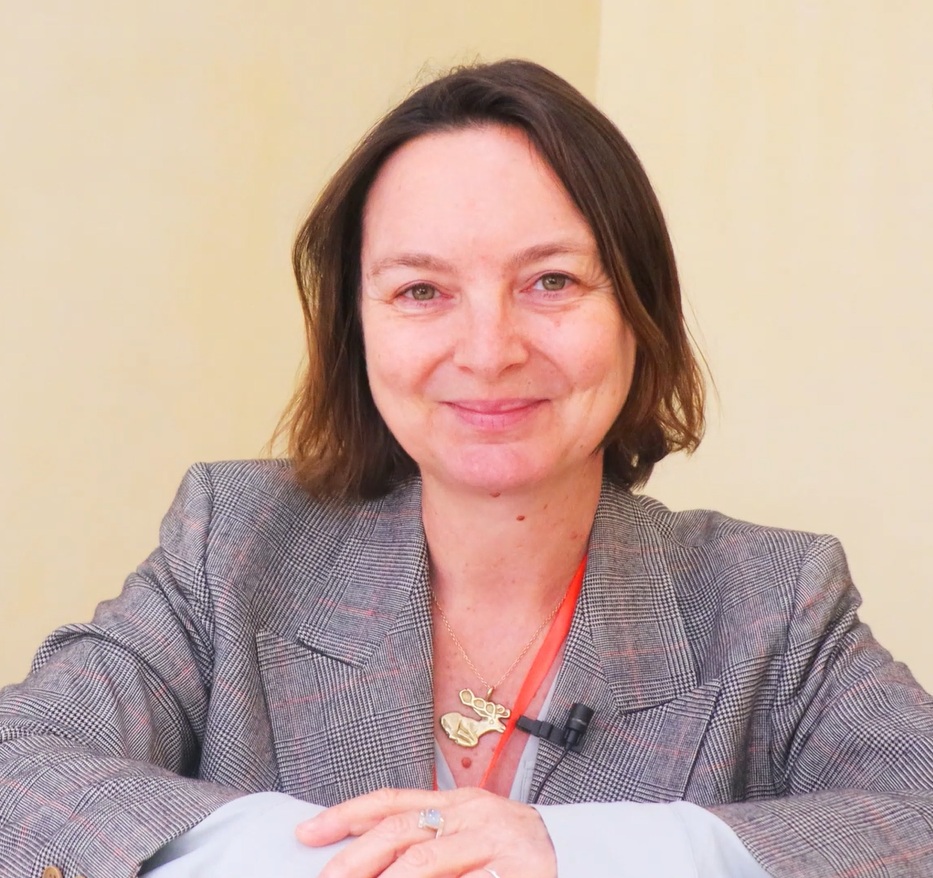La matérialisation de ce que l'Union européenne appelle l'approche multi-acteurs, parce que nous avions des ministres, d'anciens ministres, des personnes de l'administration publique, des instituts de recherche, de nombreux représentants de la société civile, des étudiants et de nombreux agriculteurs.
Novembre 2025

Dans cette lettre d'information, vous découvrirez un récapitulatif de notre événement, la Conférence régionale sur l'Agroécologie : Science et politique, ainsi que les activités passées de nos partenaires du consortium. Plongez-y pour voir comment nous avançons et ce qui se profile à l'horizon !

Restez informé
Vous pouvez toujours suivre nos mises à jour et événements sur le projet site web et les médias sociaux

Aperçu de la conférence régionale sur l'agroécologie : Science et politique
Sous le haut patronage du Ministre de l'Environnement de Tunisie, l'Observatoire du Sahara et du Sahel (OSS) et l'Institut Agronomique Méditerranéen de Montpellier (CIHEAM-IAMM) ont co-organisé l'atelier de formation à l'utilisation des technologies de l'information et de la communication (TIC) de l'Observatoire du Sahara et du Sahel. Conférence régionale sur l'agroécologie : Science et politique dans le cadre de la Projet Horizon Europe NATAE.
Plus de 150 participants en personne et près de 200 en ligne de plus de 30 pays. La conférence a rassemblé une délégation impressionnante de ministres, d'ambassadeurs, de décideurs politiques, d'agences de développement, d'organisations d'agriculteurs, d'acteurs de la société civile, de chercheurs et de représentants du secteur privé, anciens et actuels.
La conférence a servi de plateforme dynamique pour partager des idées, des stratégies et des approches innovantes afin d'accélérer la transition agroécologique en Afrique du Nord et dans la région méditerranéenne et de relever les défis urgents de la région : la dégradation des sols, la pénurie d'eau, la perte de biodiversité et le changement climatique.
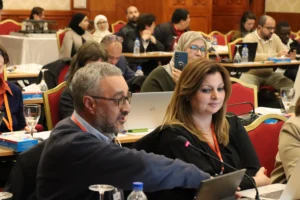
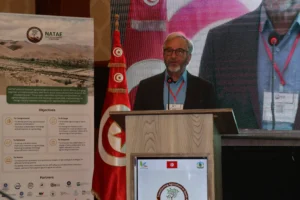
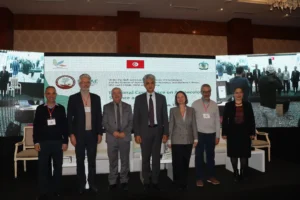
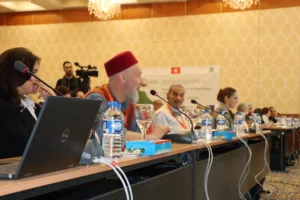
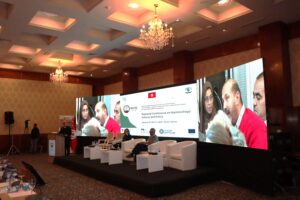
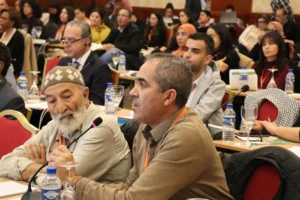
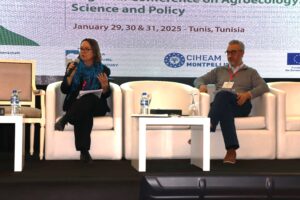
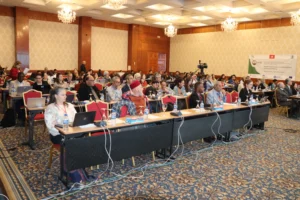
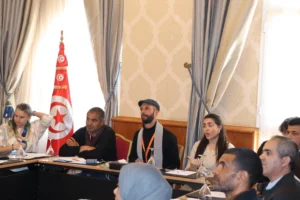
Chiffres remarquables de la conférence
Principaux thèmes de la conférence
Accélérer la transition agroécologique pour des systèmes alimentaires résilients en Afrique du Nord
- Intégration des politiques : Stratégies d'intégration de l'agroécologie dans les politiques publiques et les cadres réglementaires
- Éducation et formation : Renforcement des capacités et transfert de connaissances à tous les niveaux d'enseignement
- Mécanismes de financement : Solutions de financement innovantes et incitations économiques pour la transition agroécologique
- Recherche et innovation : Progrès scientifiques grâce aux laboratoires vivants et aux réseaux de recherche collaborative
- Engagement multipartite : Impliquer les gouvernements, la société civile, le secteur privé et les organisations internationales
Recommandations stratégiques pour la transition agroécologique :
- Reconnaissance et modernisation : Reconnaître l'agroécologie comme une forme moderne et innovante d'agriculture, et non comme une pratique dépassée, en soulignant son rôle de vecteur de santé publique.
- Intégration des politiques : Faire de l'agroécologie une approche intégrée et globale dans les politiques publiques agricoles et multisectorielles
- Innovation financière : Impliquer le secteur privé avec des produits financiers adaptés et accessibles, en réorientant les subventions des intrants chimiques vers des alternatives écologiques.
- Éducation et sensibilisation : Promouvoir de vastes campagnes de sensibilisation et d'éducation à l'intention des consommateurs, des producteurs et des établissements d'enseignement.
- Développement du marché : Faciliter la mise en place de chaînes d'approvisionnement et promouvoir les marchés publics pour les produits agroécologiques
- Viabilité économique : Démontrer la viabilité économique et la productivité des exploitations agroécologiques, notamment en cas de crise climatique.
- Recherche et mise en réseau : Intégrer l'agroécologie dans la recherche, l'éducation et la formation à tous les niveaux ; renforcer la coopération régionale par le biais de réseaux tels que MEDAE
La conférence s'est achevée sur des engagements forts en faveur d'une collaboration continue et de la mise en œuvre de pratiques agroécologiques dans toute la région. Les prochaines étapes clés sont les suivantes :
- Développement de politiques agroécologiques nationales et de cadres réglementaires
- Mise en place de mécanismes de coopération régionale et de plateformes de partage des connaissances
- Création d'instruments de financement spécifiquement conçus pour la transition agroécologique
- Renforcement du réseau MEDAE pour une collaboration continue
- Mise en œuvre de laboratoires vivants et de projets de démonstration dans les pays participants

TESTIMONIALES
Lors de la conférence régionale sur l'agroécologie, des experts, des décideurs politiques et des acteurs clés se sont réunis pour discuter de stratégies visant à promouvoir l'agriculture durable en Afrique du Nord. Regardez leurs témoignages, mettez en évidence les principaux défis et soulignez le rôle essentiel des cadres politiques, de l'éducation et du financement dans la conduite de la transition agroécologique de la région.
Un très bon forum réunissant tous les experts dans différents domaines - fonctionnaires, société civile, secteur privé, étudiants, chercheurs. L'agroécologie est un sujet très pertinent dans le monde d'aujourd'hui, car le monde entier se concentre sur le changement climatique.
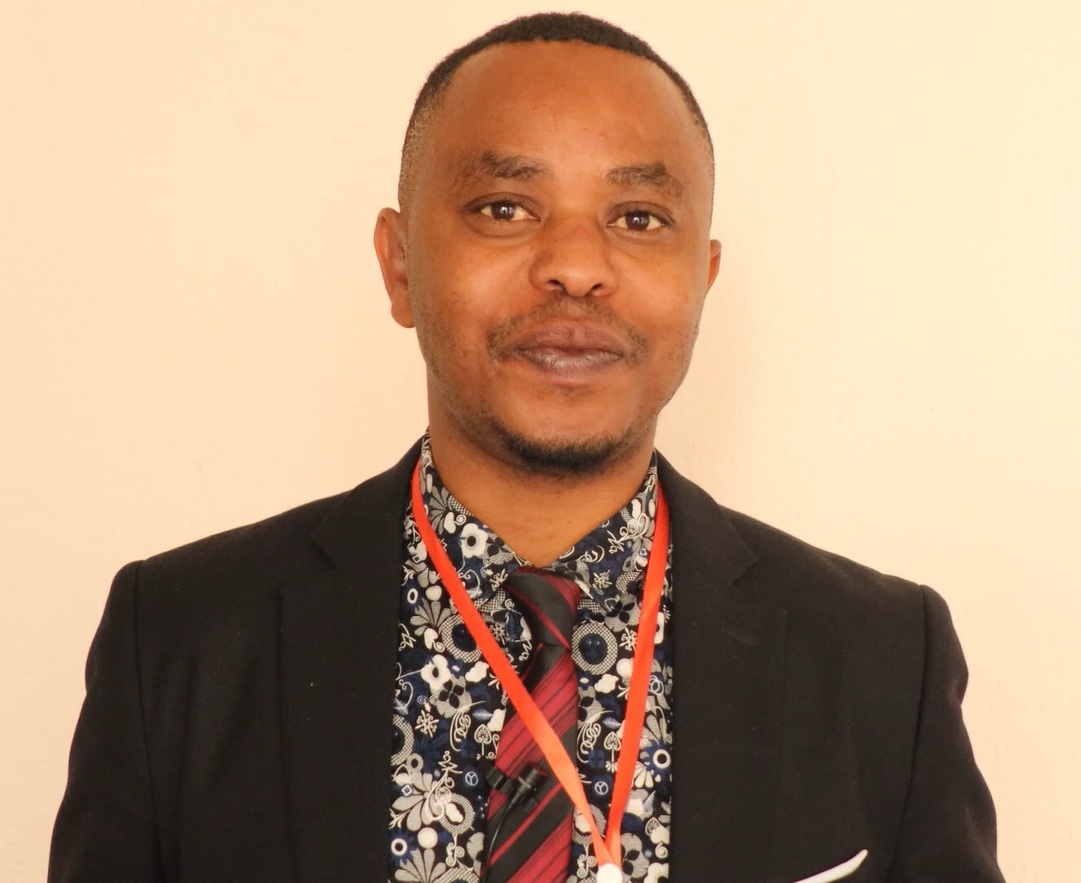
Conférence importante, il s'agit de tirer des enseignements importants pour promouvoir nos politiques, nos stratégies et nos plans d'action en matière d'agroécologie et pour s'assurer que notre programme de corridor vert est cohérent avec les meilleures pratiques au niveau national et international.
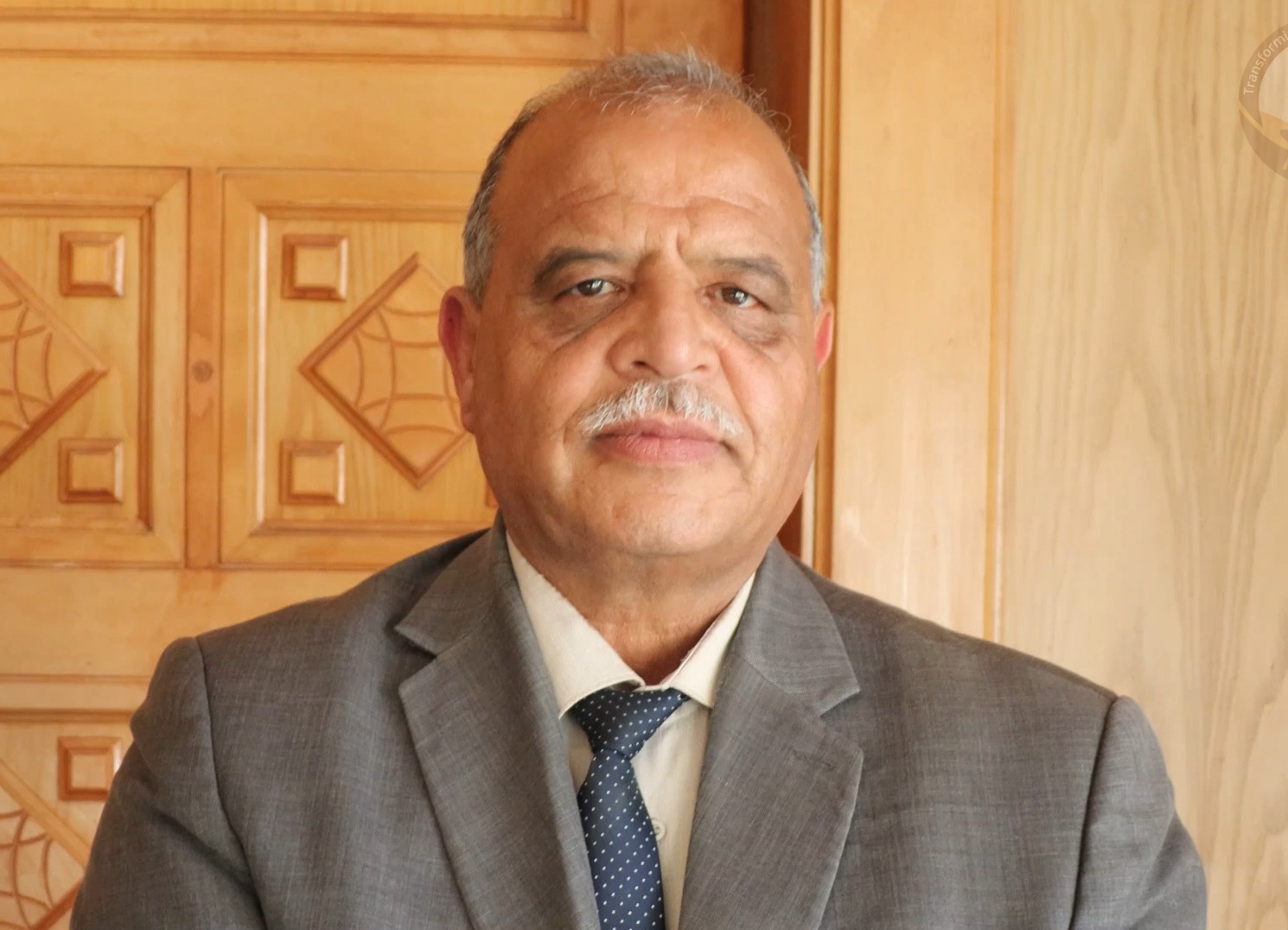
A l'issue des 2 premiers jours de cet atelier, il est très clair que le monde en général et en particulier nous les pays africains du Nord qui avons des zones arides, nous avons tout intérêt à développer, à faire la transition agroécologique car la survie de nos terres en dépend.
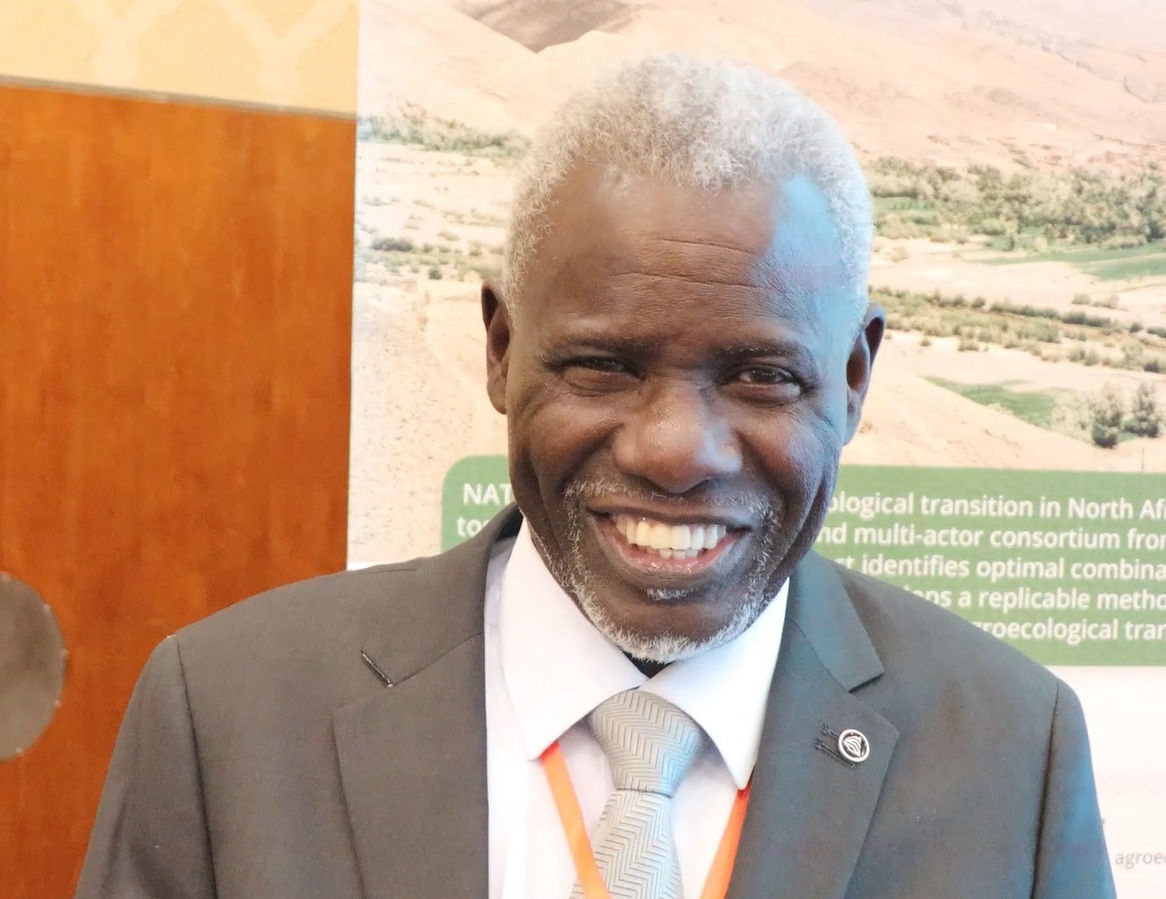
Si un événement géopolitique venait à perturber les importations, la situation serait encore plus critique. L'agroécologie est vraiment la solution à long terme pour une transition en douceur, et à court terme si l'environnement devient soudainement beaucoup plus difficile.
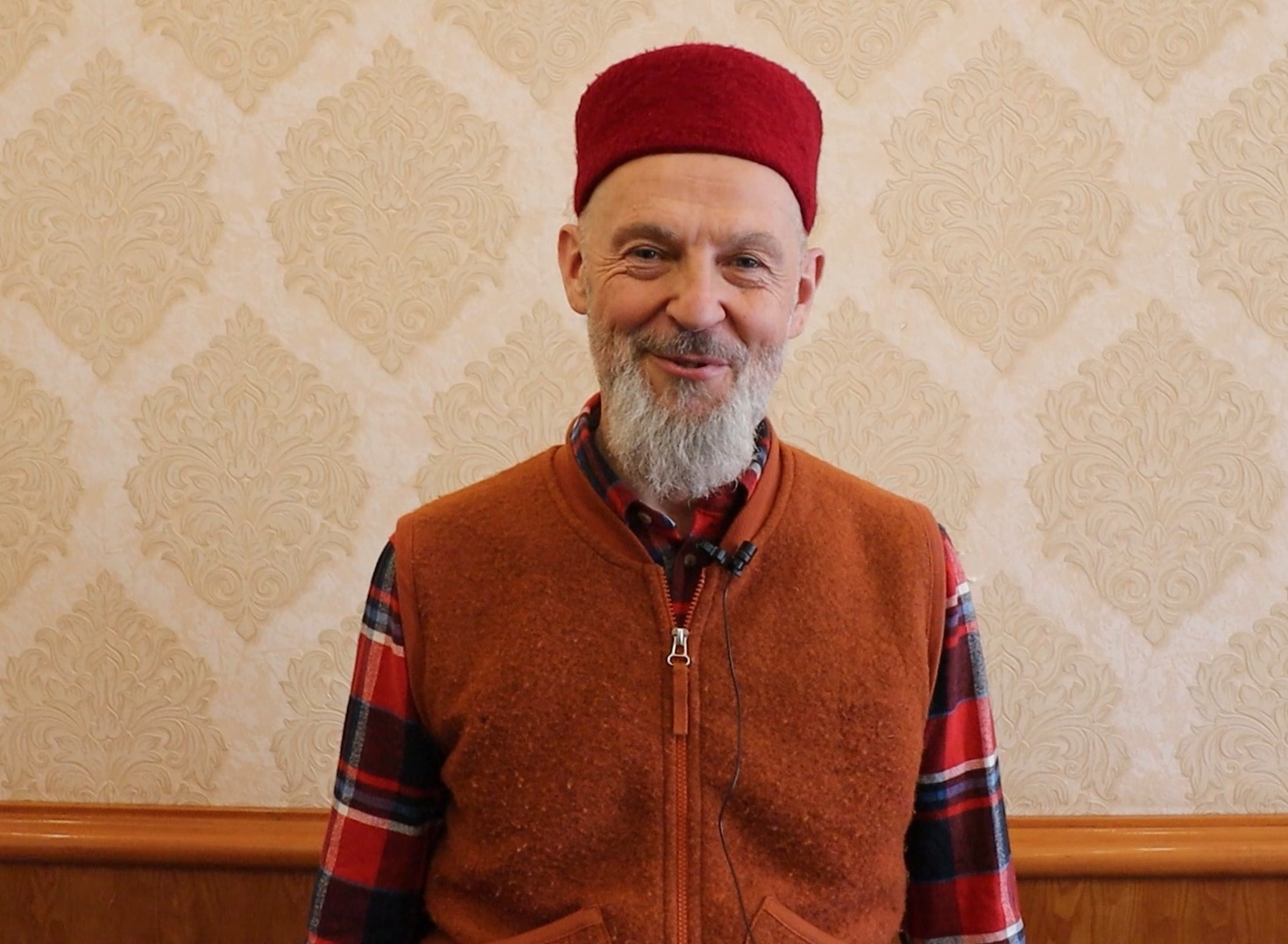
Avec nos collègues tunisiens, nous essaierons de travailler ensemble pour proposer un programme suffisamment riche répondant à tous les critères et paramètres de l'agroécologie. Nous espérons retourner en Algérie après cette rencontre pour relancer l'agriculture agroécologique, surtout pour les grandes cultures, en se concentrant davantage sur l'agriculture de conservation des sols, avec l'aide de Dieu.
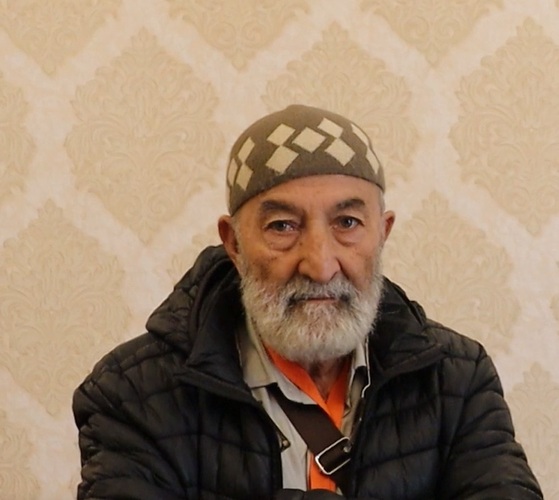
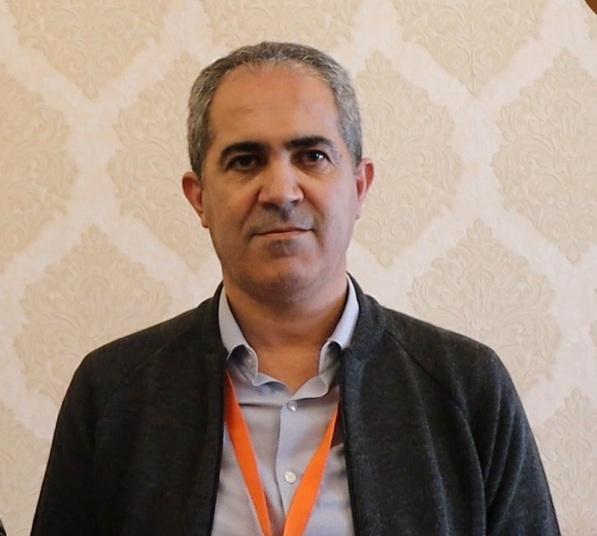

Récapitulatif des nouvelles et des événements
Voir ci-dessous les activités des partenaires du consortium NATAE entre octobre 2024 et mars 2025
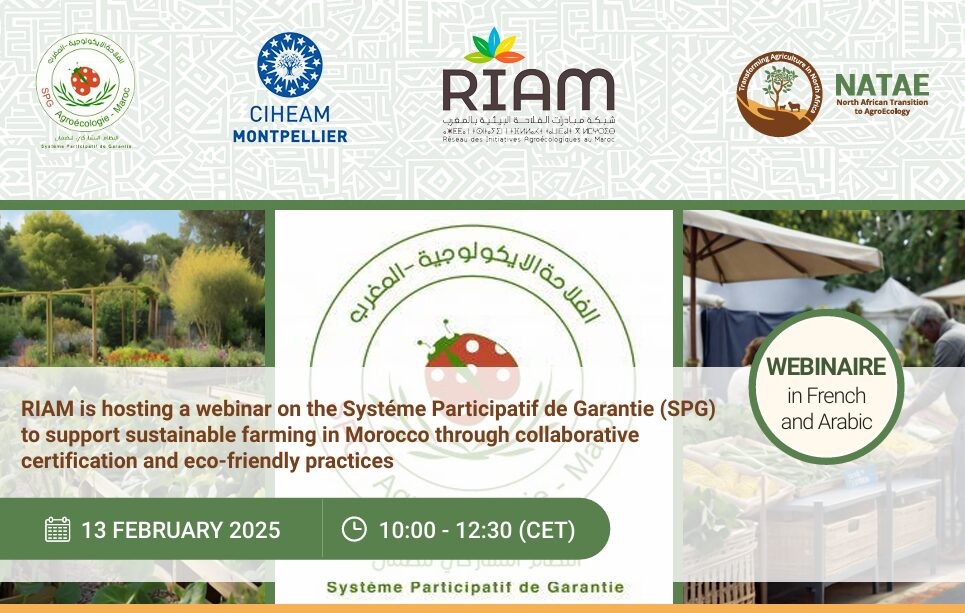
APPEL À CANDIDATURES - École internationale de terrain
Le RIAM (Réseau d'Initiatives Agroécologiques au Maroc) organise un webinaire sur le Système Participatif de Garantie (SPG) dans le cadre du projet NATAE, financé par l'Union européenne et piloté par le CIHEAM IAMM. Cette initiative vise à connecter les acteurs de l'agroécologie et de la transition écologique au Maroc.
Lancement de visites croisées en Tunisie avec le laboratoire vivant Siliana - El Krib (INAT)
Du 25 au 28 janvier, 20 agriculteurs, chercheurs et acteurs du développement de Tunisie, du Maroc, d'Algérie, de France et des Pays-Bas se sont réunis en Tunisie pour la première visite croisée organisée dans le cadre du projet NATAE. Parmi les participants figuraient des représentants des laboratoires de Laghouat, Tizi Ouzou et Sétif (Algérie), et Boulmane (Maroc), ainsi que des chercheurs de la WUR et de l'IAMM.
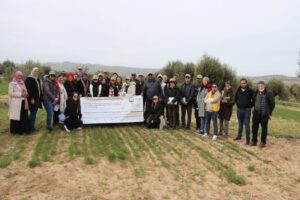
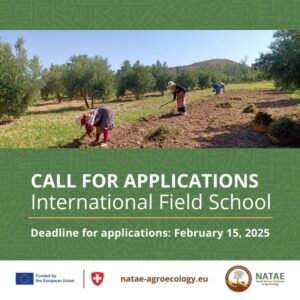
APPEL À CANDIDATURES - École internationale de terrain
L'Institut national agronomique de Tunisie (INAT) invite les étudiants en agronomie, en économie rurale et en sociologie à un stage pratique à Kebili, en Tunisie, dans le cadre du projet NATAE. Ouvert aux étudiants en dernière année d'études d'ingénieur et de master des pays membres de NATAE, il s'agit d'une occasion unique de rencontrer des experts de l'agroécologie et de l'industrie. (https://www.iamm.ciheam.org/fr/project/natae/).
La journée de lancement de la NATAE au Living Lab d'El Krib marque une étape importante pour l'agroécologie en Tunisie
Le Living Lab d'El Krib dans le district de Siliana, en Tunisie, a marqué le début de la saison agricole 2024-25 avec une journée de lancement sur le terrain le 24 octobre 2024 dans le cadre du projet NATAE. Soutenu par l'Initiative de recherche du CGIAR sur l'agroécologie et accueilli par l'ICARDA en collaboration avec l'INGC, l'INAT et les parties prenantes locales, l'événement a rassemblé 54 participants, dont des agriculteurs, des chercheurs, des agents de vulgarisation et des ONG, avec une participation féminine remarquable de 50%.
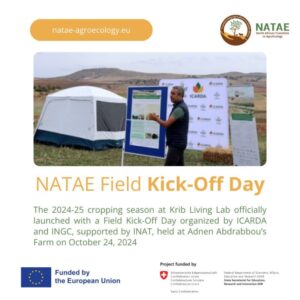
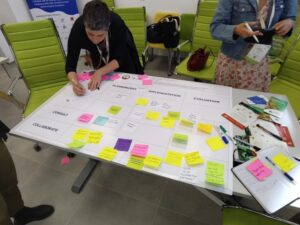
Atelier : Déploiement d'approches de laboratoires vivants en Afrique pour une agriculture durable
Dans le prolongement du webinaire " Agroecology Living Labs in Africa ", au cours duquel les quatre projets du programme Horizon Europe Farm to Fork PrAEctiCE, CANALLS, CIRAWA et NATAE ont partagé leurs perspectives sur le développement des Living Labs à travers l'Afrique, un atelier hors ligne a été coorganisé lors des Open Living Lab Days 2024 à Timișoara, en Roumanie. L'événement d'une heure et demie a réuni autour d'une table ronde des participants qui étaient soit impliqués dans un Living Lab...
MEDAE
Voir ci-dessous pour l'activité du MEDAE entre octobre 2024 et mars 2025.

Webinare Medae: Quelles sont les perspectives de soutien au déploiement de l’agroécologie dans les politiques publiques en Afrique du Nord?
MEDAE mettra en place un webinaire qui présentera les résultats d'une analyse transversale des politiques publiques en Afrique du Nord, ainsi qu'un examen de la place de l'agroécologie dans les conventions internationales, et examinera dans quelle mesure ces politiques fournissent un cadre favorable ou défavorable à la transition agroécologique.
Votre organisation souhaite-t-elle contribuer aux activités du réseau MEDAE ?
du Projet

